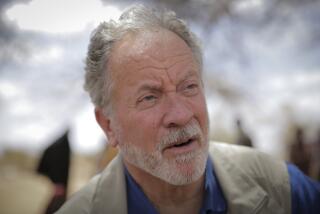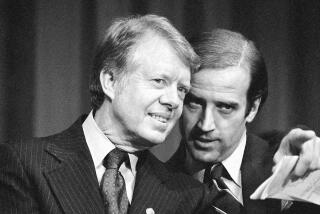As a Citizen of the World, Mickey Leland’s Mission Was Humanity, Not Ideology
- Share via
Mickey Leland always flew into the storm.
I remember being in Houston with Mickey in October, 1986, where he had invited me to come to work with him on a crusade for moral and educational excellence in the Houston schools. We were meeting late, when the phone rang at 2 in the morning.
It was a woman in Mississippi who told us that an old and distinguished African American college, Mississippi Valley State College, was about to be turned into a state prison. Could I come to Mississippi in the morning to help reverse this decision?
There were terrible storms in the South and the airport had put commercial flights on hold indefinitely. So I called the woman back and said “We can’t get there. No plane will leave.”
But Mickey stayed up that night and kept looking, and not only did he find a private pilot who would fly us there, he went with me to Mississippi before dawn. When we arrived, the plane was battered and damaged from the storm.
That was the way Mickey was: flying from Texas to Mississippi in the middle of the night in stormy weather to help save from the ultimate insult a African-American college that some people loved.
In his dazzling career as a political leader, Mickey Leland was always flying into the eye of the storm.
After he was elected to the Texas Legislature in 1972 at the young age of 28, Mickey made a trip to Africa. He was planning on spending three weeks in Tanzania but became so compelled by his anti-hunger and anti-poverty work there that he stayed three months.
Mickey never lost his passion for the people of Africa. When he was able to establish, over the opposition of those in Congress who said it was a waste of money, the House Select Committee on World Hunger, he became its chairman. And many, many people in Africa lived because of his leadership. In 1985, the year after the creation of his committee, the United States sent $800 million in aid to famine-stricken Ethiopia.
When he returned from a trip to the Sudan in April, Mickey responded eloquently to criticism that he should be spending all of his time on problems in the United States.
“I am as much a citizen of this world as I am of my country. To hell with those people who are critical of what I am able to do to help save peoples’ lives. I don’t mean to sound hokey but I grew up on a Christian ethic, which says we are supposed to help our brothers.”
For Mickey, hunger was not just another political issue. For him, who eats and who dies was the central moral question of our time. Mickey said he lived every day with the image of a young girl who died of the effects of starvation before his eyes in Sudan in 1984.
Mickey was not your average politician. His only ideological commitment was to humanity itself. He often took courageous stands that were not politically expedient.
As a Texas congressman, he opposed all aid to the Contras, who he saw as murderers, rapists and bandits.
He often visited Cuban President Fidel Castro, and had negotiated the release of three Cuban political prisoners and their families. Mickey saw that it was hypocritical for the United States to have full diplomatic relations with the vicious apartheid state of South Africa but to refuse relations with Cuba, a tiny island 90 miles away from us.
A passionate lover of humanity, Mickey built bridges between communities of long-lost friends. Fluent in Spanish, Mickey understood the importance of bilingual education for Mexican Americans struggling to make their place in America. He brought African Americans and Latinos together.
He founded a program to send poor African American teen-agers to Israel during the summer to learn about Jewish heritage, and he once bicycled through Israel. One of the people who died with Mickey was Ivan Tillem, a distinguished anti-hunger and human-rights activist in his own right, and editor and publisher of the Jewish Directory and Almanac.
Mickey often quoted the Talmud, saying, “If you save one life, you save the whole world.”
Mickey died, as he lived, flying into the eye of a storm to fight hunger and despair, to save one life and life of the whole world, with African Americans and whites, Christians and Jews at his side as his traveling companions and comrades.
During this painful time, I take comfort in a passage from Corinthians: “We are troubled on every side, yet not distressed; we are perplexed, but not in dispair; Persecuted, but not forsaken; cast down, but not destroyed.”
This Earth is a far richer place because of Mickey Leland and a far poorer place without him. We can do his memory no greater honor than to recommit ourselves to taking care of the hungry and homeless part of humanity that Mickey loved with all his heart and was serving at the time of his shocking and tragic death.
More to Read
Sign up for Essential California
The most important California stories and recommendations in your inbox every morning.
You may occasionally receive promotional content from the Los Angeles Times.












